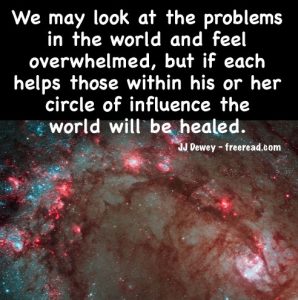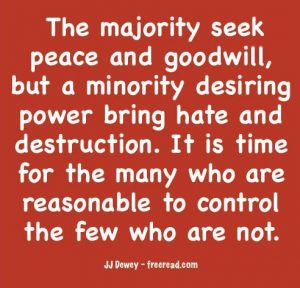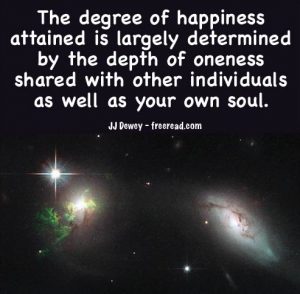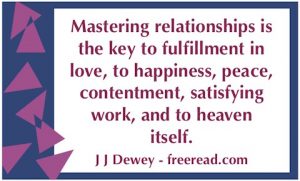
To Rebel or Not
Is a statement true or false independent of who says it? If Hitler says that 2+2=4 is it still as true as if Jesus said it?
Yes it is.
As The Course in Miracles says: “The truth is true and nothing else is true.”
When a deceiver like a Goering or Hitler, makes a statement that seems to be true we need to look beyond the black and white of the statement and look at other considerations. Is the speaker using this fact to mislead his audience? What was his real motive in making the statement? In what context was the statement made?
By asking these questions we may discover the deceit which is veiled by the truth.
Chapter thirteen of “The Lost Key of the Buddha” tells us that if a law of a nation or group is supported by a majority of the people that it is wise to obey that law, even if it runs contrary to a founding document.
But what if an individual does not like the law, or if it goes contrary to his belief system? Should he then roll over and play dead? If not, what should he do?
Answer: If he does not like the law, he should still obey it if the law has majority support, but he should work to change the law. This will be difficult if the law is indeed supported by the majority. When this obstacle is in the way the person must work with the majority by educating them. If the idea of what the law should be is truly beneficial, then educating the people and changing the law is a real possibility.
On the other hand, if the ideas and concepts would truly not improve things when implemented then it would be difficult indeed to sway the majority, even with education. Unfortunately, more often than not this is the case. There are a lot of minorities who think they have all the answers and it is only by the grace of God that they have no power to implement them. For this we should be thankful.
Those who are in the minority and believe they have a good idea must consider what I call the War in Heaven Principle.
According to scriptures and legend Satan was once an angel of light who had ideas contrary to the majority of the inhabitants of heaven. He was successful in convincing one third of the hosts of heaven to rebel against God and his supporters. This resulted in the great War in Heaven with Satan and his hosts losing the battle with the majority and being cast out of heaven. Then the scriptures go on to tell us that this disgruntled minority who followed him still refuses to yield to the majority will and continues to make war on God’s servants on the earth. We are told that these lashing out attacks are fruitless because the devil’s “time is short” and failure will be the only result.
Now, what do we learn from this account? Several things. First that in order to even wage a good rebellion, as Satan did, we must have a good enough argument to attract the attention and respect of a third of the people.
Secondly, the majority (two thirds) of those who heard both sides of the argument chose the higher ground, or that which was the highest good in the eyes of God.
Thirdly, even though Satan had gathered an army of one third of the inhabitants of heaven, he still did not prevail. The majority still won even though the third were very determined.
Fourth, if Satan would have been smart he would have continued his subterfuge until he had close to majority support before launching a war.. Or better still maybe he could have altered his philosophy a bit to capture the ears of that additional one sixth he needed to prevail.
Now there are exceptions to all things but all things being equal we have four general rules here to which all people who desire change should pay attention:
(1) It takes a third to launch a good rebellion. (2) The informed majority choose the good (3) The majority usually prevails (4) You must have ideas that attract the ear of the majority to win the battle.
Now in the United States and a number of other countries throughout the world the greatest desire for rebellion comes because of the tax systems. Who knows? Maybe this was part of Satan’s gripe. Maybe he thought that God was taxing too much of everyone’s time and dedication, that they should have more time to do what they want. Maybe there’s something to the saying “The idle mind is the devil’s workshop.” Maybe he promised his angels more free time to do as they pleased.
Whatever the case, taxpayers justifiably feel they are overtaxed and want relief. Even though a majority of taxpayers feel they pay too much we must take into consideration that 36% of the people of the United States pay no Federal Income Tax whatsoever. Most of these people receive more from the government than they take in thus giving them little incentive to reform the system
Let us say then that you had a plan for either tax rebellion or tax reform and 50% of the taxpayers were with you. How many would really be with you? One half of the federal taxpayers is only 32% of the people, so even here one would not have the devil’s third.
But as far as a tax rebellion goes, a taxpayer would have to risk his freedom to participate and how many are willing to do this? Very few, especially when the rebels are in such a minority.
So what is the real situation that the tax reformers or tax rebels are in?
Those who are concerned enough to work toward some type of tax reform are far from the 32% and the number willing to rebel and risk liberty are far less.
What does this tell us?
It tells us that there is no plan for major tax reform or rebellion out there that captures the imagination of enough people to even make a dent in the system as presently constituted.
Thus means that tax reformers and rebels must face this certain stark fact. Unless there is a major change to the system or the approach toward reform that nothing will change.
If the reformer has no chance of changing anything, then why risk life and limb for nothing? If you are willing to take some risks for a good principle then why not pick a battle where real progress can be made? Either that or come up with a creative plan for tax reform that has greater appeal than those of the past.
The tax reformer is generally not taking great risk as it is fairly acceptable within the system to work through the system for improvement.
The tax rebel is a different case. Even though he has the advantage of not paying taxes there are many other disadvantages. Among them are:
(1) He is a direct threat to the system and even if he presents a technically legal case for his cause, it is difficult to fight City Hall. If the powers-that-be want him bad enough they’ll figure out a way to get him.
(2) He has to work outside the system and if he wants to hire employees it will be difficult to find honest ones since many of the criminal element also work outside the system.
(3) It will be difficult to create any type of major business, for if he did, this would attract the attention of authorities forcing it into the system or leading to its destruction.
That said let us examine the moral arguments as to whether to pay taxes or rebel against the system.
Reasons to not pay graduated income taxes: (1) It can be shown to be unconstitutional and some argue that the 16th amendment was not correctly ratified and even if it was it contradicts previous amendments.
Comment: The problem with this argument was given in chapter thirteen wherein we are told that every group or nation always drifts from the principles of its founding documents. This drift is usually not for the better if we look at the founding document as positive, but may be good if the founding document is flawed. Overall this drift creates periodical points of tension, or windows of opportunity. When these windows appear then, at that time, real change can be wrought. When there is no window the best thing a person can do is prepare for the coming day of opportunity.
Another problem with this reason is there are thousands of laws on the books which could be argued as being unconstitutional. They are so pervasive that any person of common sense can see that he cannot defy them all.
A third point is that the Constitution is a foundation of law, not God breathed morality. Some Constitutionalists act as if the document was given by God himself and if it is not followed to the absolute letter that the offender will go to political hellfire and damnation.
While I believe the basic principles in the Constitution were inspired they are not infallible and were more pertinent, in some aspects, to the time which was created than our present time. Even so, many of its basic tenants are applicable to people of all times.
It is interesting that the Founding Fathers did not look on the Constitution with the awe that many current Constitutionalists do. The Founders thought they did a good job, but not a perfect job and some expressed the hope that future generations would improve upon it. They probably would be rolling over in their graves, however, if they were able to see some of the current lack of respect for the document.
The Constitution then is a legal, not a religious document and must always be honored for its practical usefulness. Ideally the law of the land should be strictly based upon it, but in the real world this has never been the case and probably will never be.
The will of the majority is an even stronger force for the manifestation of law than a founding document. No matter what a founding document or a current law says, the will of the people can change it, override it, or go contrary to it.
The teacher who can enlighten and mold the will of the majority is more powerful than any law or set of laws.
(2) The second reason given to not pay tax is that taxation is not a moral principle. It is wrong the state to impose certain types of taxes upon it’s citizens. In a way it is stealing from one group of people and giving to another.
What is often not taken into consideration here is that the Constitution, which most tax protesters believe in, gives the Congress “power to lay and collect taxes..” (Article I, section 8) Even though the original Constitution implies that individuals should not be taxed directly, a tax is still a tax which takes from one group and gives to another. If we support taxation, even as it is outlined in the Constitution, then we must support taking money by force of law from one group and giving it to another.
The fact is most people would support taxation if the tax was a fair amount that did not increase the burden on the taxpayer with greater rapidity each year with no end in sight. People feel they are stolen from when an unfair amount is taken from them and given to causes and people not approved by the taxpayer. If the taxpayer was taxed a fair amount and he felt he received some benefit from the tax money then he would not feel like he was stolen from. It would then be seen as the cost of citizenship from which he receives a benefit. The concept of a fair tax should be seen as something similar to paying dues to belonging to a health club. You pay and you receive a just benefit. But when we are overtaxed it is like paying many times what the health club is worth, and this creates a feeling of injustice in the taxpayer, as if he is being held up by bank robbers.
(3) The third reason given for not paying taxes is the citizen may not like how the tax money is spent. Perhaps he receives little or no personal benefit from it.
I can identify with this since about the only benefit I receive from taxes collected from federal income taxation is from our military keeping us secure as a nation.
On the other hand, the complaint of how the tax money has been spent has always been with us, even from the days of the Founding Fathers. If everyone who had a gripe of how the money is spent did not pay taxes then neither the United States nor any other country could have raised enough money to create a secure nation.
Even the law abiding taxpayer can look at these three reasons and identify somewhat with the tax rebel. No one likes paying taxes, especially income taxes, but most accept them as a bitter pill or necessary evil.
The prime question we now want to examine is this. While it is true that there are many personal reasons that many of us would like to escape taxation what is the truth of the matter from a spiritual viewpoint?
To understand the true principle by which we should be governed the seeker must understand that the nation of which he is a citizen is a living entity and each individual corresponds to a cell within the greater body.
Since I live in the United States, we’ll use this for an example as we examine the Law of Correspondences.
The prime ingredient that makes everything work and gives energy to the human body is oxygen. What is the correspondent to oxygen in a nation? Yes, its money.
What part of the body taxes or pulls oxygen from the rest of the body?
It is the brain. Brain cells require ten times as much oxygen as regular cells and overall the head requires 20-25% of the entire oxygen supply circulating through the entire body.
Where is the head center of the United States? This is verified by DK to be Washington DC. Does the head of government require more money than the rest of the country?
Yes, it does.
If we count all taxes by all government in the country (symbolizing the full head center) we find that our tax rate is around 50%. Now what would happen to a human body if such a surplus of oxygen went to the head at the expense of the rest of the body?
The answer is that the lower body would become ill and weakened whereas the head with a surplus of oxygen would become light-headed and giddy causing its judgment to be weak and its vision blurry.
Higher and lower correspondences are never exact, but always point in the direction of truth. Whereas the brain cells need ten times the oxygen as regular cells it does seem true that government bureaucrats do control at least ten times the money of the average citizen.
The fact that the brain needs 20-25% of the entire oxygen supply of the body is interesting to contemplate. Is this then the maximum figure at which the rest of the body should be taxed? It would be nice if this were the case, but if we figure in all taxes the amount is double that indicating that by using this direct analogy we are taxed at about double the amount we should be.
There is one more item to consider and that is the head weighs about 7% of the weight of the body. Thus 7% of the body’s oxygen supply belongs to the head if there was an equal sharing. This tells us that the head really taxes the rest of the body between 13-17% more than it is entitled to as standard wages so to speak. Therefore if we use a precise correspondence it would stand to reason that the government should be able to get along fine with maximum tax from all sources of 13-17%.
Most taxpayers would be happy with this maximum, but as I said the higher and lower correspondences are rarely exact. The amount could be a little more or somewhat less.
Perhaps the Bible gives us a clue as to what the ideal tax should be. In ancient Israel God commended his people to pay ten percent of their income and this amount was used to pay for all governing and spiritual matters.
13-17% would be great compared to what we have today, but 10% would be even better. With a low tax such as this many who have an abundance would donate additional money to good causes which would indeed bring the average surplus given to rise to the 13-17% level.
As I previously stated each person within a country corresponds to a cell within the whole body. Each cell within the body takes the oxygen it needs for its well being and passes the surplus on for the others to use with a large quantity of it going to the head.
The person who refuses to pay tax to the Federal Government would correspond to a cell who may share some with fellow cells, but refuses to let any oxygen passing through him to go to the head. His reasons may sound just. He may say, “the head requires more than it needs,” or “the head is not taking oxygen by lawful means.” He may thus feel justified in refusing to cooperate.
The criticism from the rebellious cell may be correct but it does not negate the fact that the head is the decision-maker for the body and has power to command the body to move in any direction it pleases. The head is influenced by the heart, the feelings, the appetites, and the needs of the rest of the body, but none of these other parts have power to make final decisions. The heart and the other parts can influence the head, but this does not negate the fact that the ultimate power of decision for the whole of the body is dominated by the head. Even though the head has power to make decisions contrary to majority influence it rarely does because of the consistent exertion of this majority.
If the majority of the body is cold the head does have power to refuse to put on a jacket, but will rarely do so. As a general principle the majority rules.
It is within the functioning of the body for a cell or other parts to think contrary to the head. For instance, the head may want to read, but the heart may want to make love. If therefore, lovemaking is to be the order of the day, the heart must convince the head to go along with its wishes. But if the head wishes to merely read it does not have to convince the heart of anything. It can ignore the heart and just read (silly head).
A single cell can defy the wishes of the head and refuse to cooperate by yielding the required oxygen. This affects the head very little for it just takes what it wants from the surrounding cells. If a small number of cells rebel the head will let the natural law of the body deal with them, but if a larger number rebel then the head will feel a drain on its strength and make a decision to apply pressure on the rebel cells. If the pressure does not work then eventually the head will seek to flush the rebel cells out of the body.
Now the rebel cells like the body as a whole and do not wish to leave, but feel the head is out of order. Some declare themselves free from all association with the head or body while attempting to stay within the body and sharing life with the body. Many rebel cells do not support the decisions made by the head.
As time goes on the rebel cells become more detached from the head as well as many other parts of the body and the head becomes angrier with the rebels. In frustration the head exclaims: “Do you rebels not realize that if all followed your direction that our brain would die and this would be followed by the death of the whole body?” Is that what you want?”
“No,” said a rebel cell. “I want the body to be healthier than ever. I want you to change your ways and draw minimal oxygen according to the law as we read it.”
“But I decide the law,” said the head. “Many cells grumble about the amount they have to give but the pull on me is strong from many who receive the surplus I order to be circulated to the various parts of the body. If I only took a minimal supply of oxygen as you request, then many parts of the body would feel deprived and there would be rebellion and sickness within the body.”
“But there is already sickness within the body,” said the rebel.
“But if we had a quick change as you suggest the body would be under such distress that it may die. Besides, I like things the way they are. I pass much of the surplus into my favorite parts of the body and they praise me for it. I see no benefit in changing.”
“But you must change?”
“Will you change and support the life of the body?” asked the head.
“No. I must stand by my principles,” said the rebel.
“And I must stand by mine” said the head. “Meanwhile, I receive no value from you and ask you to leave. There is a gentle wind coming up. Hop on it and catch a ride to another body more suited to your taste.”
“There is none more suited to my taste. This is my home and this is where I wish to stay,” said the rebel.
“So. You admit that this is your most desirable body to call your home, yet you will not support decisions I make which govern the whole of the body. This makes you a life within a life and a law unto yourself. It is as if you are here, but not here. I listen to the cells who send me oxygen, but I shall not listen to you and will tell other cells to ignore you also. I will seek to make life so discomforting to you that you will leave.”
“So be it,” said the rebel.
“So be it,” said the head.
Conclusion: Both the head and the rebels have their arguments, but the few rebel cells are no match for the head who has the power of decision for the body. Even though the head may be selfish, bullheaded and in error in a number of matters it is still the head and without the support of the cells the body dies.
If the rebels wish to change the mind of the head they must use the principle of cooperation rather than rebellion. If they pay the demands of the head they can then have greater power to attract the attention of the cooperating cells and teach them the correct principles whereby the head should govern. When the majority of the body begin to make demands on the head it will then listen and decide accordingly.
And what should the cells do if they cooperate and teach yet nothing seems to change?
In this case, they should leave the old body and assist in the creation of a new body that functions on fair principles. When this occurs the new body will have such health and vitality that the previous body will come to it and inquire: “Tell me my friend the secret of your great health?”
When this time comes the new body will share and the old will listen and learn.
Oct 15, 2002
Copyright By J J Dewey
Index for Original Archives
Index for Recent Posts
Easy Access to All the Writings
Register at Freeread Here
Log on to Freeread Here
For Free Book go HERE and other books HERE
JJ’s Amazon page HERE
Gather with JJ on Facebook HERE









